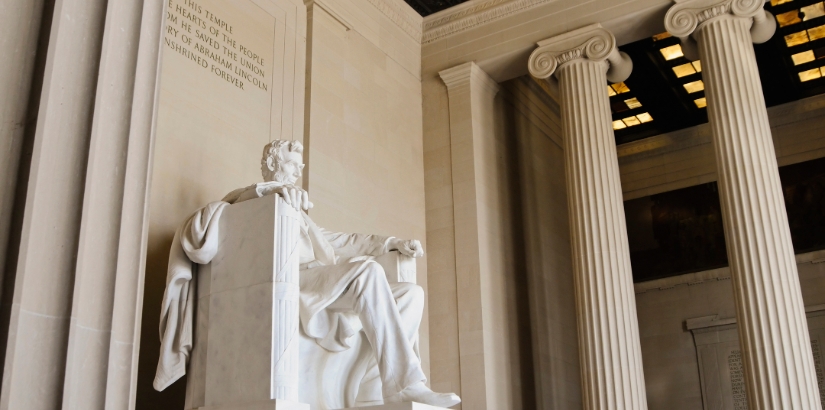Friday Reflection | January 8, 2021
Amidst the chaos of 2020, the day in early September when the Bay Area remained shrouded in an unnatural darkness still stands out. The event was caused by wildfires, but the fires themselves weren’t the memorable part. Sadly, we were familiar from recent fire seasons with unbreathable air and evacuations. Deeply unsettling was a morning without light, with the sky remaining dark hours after dawn.
This week, a different kind of darkness befell our nation when the US Capitol was violently stormed to disrupt the mechanisms of democracy. The full repercussions of this previously unthinkable event are yet unknown. Ultimately, there were two more enduring headlines from Wednesday: Congress confirmed President-elect Joe Biden’s win in the presidential election and both Raphael Warnock and Jon Ossoff won Senate seats in the Georgia runoffs to secure a razor thin majority for the Democrats.
A Balanced Blue Wave
The incoming Congress is likely to be moderate despite the Georgia victories, which is soothing fears about tax overhaul and policy changes. Investors understand that the Biden administration will focus on economic stimulus and vaccine distribution first as they inherit a struggling economy with high unemployment. From May through December, the US economy added back 12.3 million jobs, which is barely more than half of the 22.2 million jobs lost in March and April.1 Many of those jobs won’t return until a vaccine can be widely distributed and public safety ensured.
Economist Dave Rosenberg projects that the US economy would have 0% real GDP growth in 2021, absent any fiscal stimulus. With the stimulus bill that already passed, the growth estimate is 3.3% and may approach 7% if additional stimulus spending exceeds $1T.2 Stock prices jumped this week to reflect new expectations for expanded government support. The market has already priced-in a post-vaccine recovery in the second half of this year, and prices may weaken if COVID testing and vaccination efforts are not well managed in 2021.
In the short-term, COVID is surging and may exacerbate the disconnect between the economy and the stock market. The current jobs report showed the economy lost 140,000 jobs in December, ending the 7-month streak of jobs gains, and yet stock prices climbed higher. Small cap stocks jumped 4% on the same day that ADP reported small businesses reduced employment by 13k for the first reduction since last April. It appears the market has re-entered “bad news is good news” territory when bad economic numbers are interpreted as increasing the odds of even more generous stimulus spending.
Green Tailwinds
Similar to when we wrote about the Orange Skies last September, we find ourselves looking forward to the future that may be brighter, and greener, as a response to current non-market forces. In that article, we discussed the realities of climate change and the tailwinds for renewable energy and green infrastructure as countries and companies try to reduce carbon output. Now, the forces include a newly Democratic Senate that makes it easier to appoint agency heads who will support an environmental agenda through policy and regulations. This accompanies social trends that are beginning to shift support and capital to cleantech and innovation.3
In addition to vaccine rollout, any economic resurgence will depend on getting millions of Americans back to work. One path forward may include a large scale infrastructure bill that doubles as a bipartisan stimulus package to rebuild our roads, bridges, and airports while creating jobs in all regions of the US. Construction stocks have already jumped on this possibility.
Green energy stocks are up dramatically as well, on the expectation that energy infrastructure will be included in any legislation. Last year, House Democrats introduced an energy infrastructure bill with more than $70B of clean energy support, and that bill could be quickly revived under a presidency more committed to sustainability in the energy sector.4 Whether or not stock prices have further room to rise in the near term, spending on green infrastructure aimed at addressing both the climate and unemployment crises may make 2021 a much more positive year economically than 2020.
1 U.S. labor market losing steam as COVID-19 pandemic rages. By Lucia Mutikani. Reuters.com
2 Breakfast with Dave. Published January 7th, 2021. Rosenberg Research.
3 Pew Research Center found that 77% of Americans view development of alternative energy sources such as wind power, solar power, and hydrogen technology as a higher priority than increasing US production of fossil fuels. Pew Research
4 House passes clean energy-packed infrastructure bill. By Ellie Potter. S&P Global Market Intelligence
 | About Brian Kozel, CFP®Brian is a partner, senior advisor, and Chief Investment Officer at North Berkeley Wealth Management. Brian helps clients feel confident as they navigate their financial journey. |
This commentary on this website reflects the personal opinions, viewpoints, and analyses of the North Berkeley Wealth Management (“North Berkeley”) employees providing such comments, and should not be regarded as a description of advisory services provided by North Berkeley or performance returns of any North Berkeley client. The views reflected in the commentary are subject to change at any time without notice. Nothing on this website constitutes investment advice, performance data, or any recommendation that any particular security, portfolio of securities, transaction, or investment strategy is suitable for any specific person. Any mention of a particular security and related performance data is not a recommendation to buy or sell that security. North Berkeley manages its clients’ accounts using a variety of investment techniques and strategies, which are not necessarily discussed in the commentary. Investments in securities involve the risk of loss. Past performance is no guarantee of future results.



